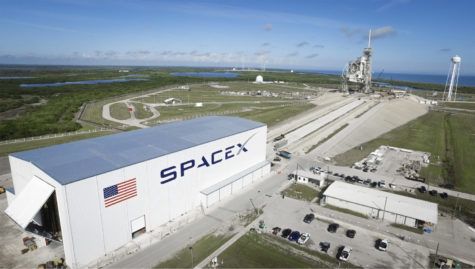Past, present and future of reusable rockets

Launch of Falcon 9 rocket.
May 25, 2017
Imagine a time in which billions of dollars wasn’t required for space advancement, and space organizations were private self-funding companies that could operate independently. Well, imagine no more! SpaceX, a private space organization based in Cape Canaveral Florida and Hawthorne California, run by Elon Musk, just launched the same Falcon 9 rocket, for a second time.
The Falcon 9 rocket is by far one of the most famous rockets launched by SpaceX. It’s a two staged rocket mainly designed for safe and easy transport of satellites and the Dragon spacecraft. It also frequently carries cargo for NASA. In 2012, the Falcon 9 made history when it set the Dragon into the correct orbit relative to the International Space Station, and was the first ever commercial company to visit the ISS. From the significance of the Falcon 9, SpaceX wanted to appeal to one of their main ideologies for future spacecraft, reusability.
This is the first reused rocket in history. On March 30, 2017, people interested in space around the world watched as a historic event unraveled before their eyes. The Falcon 9 soared into the sky, delivering the SES-10, a geostationary communications satellite. The mission also was launched from the historic launch pad 39A at Kennedy Space Center in Cape Canaveral.
You may have doubts that they could get the rocket back down to Earth. Once you know how, the idea seems quite simple, although the process is naturally complex. After the stage is separated, the actual rocket part of the entire spacecraft goes on a different course back down to Earth. Now you have your payload going to somewhere else in orbit, and you have the actual rocket going back down to Earth to be reused.
On this mission, SpaceX landed the rocket on the drone ship in the Atlantic Ocean called “Of Course I Still Love You”. From this process, they can reuse the rocket multiple times, decreasing the required funding dramatically. This was vital for space organizations to figure out, since costs were continuously rising. The innovation of reusability was imminent, but it’s good it happened now than later.

It’s not only important to look at what SpaceX is doing now, but also the future. What will the aspect of reusability improve or enhance about future missions that are already planned? One of the biggest missions coming in the next couple decades is the mission to Mars. The benefits of reusability would ultimately deter politicians’ claims that space travel is just too expensive, and getting to Mars is not plausible with the current state of the economy. Reusability makes this claim almost meaningless in its rationality. Peter Eichenbaum, a parent at NYC iSchool, expands on this by saying, “From what I have seen, I think it’s incredibly important to be able to reuse rockets. It makes space travel and space flight exponentially cheaper”.
At the start of the space age, just after WWII, funding was very high, but the costs weren’t worried about as much, since the U.S had much more congressional support with sending probes to space. The Space Race really bumped up our intentions in terms of NASA and what we wanted to do. This trend of high expectations and large sums of money going to space organizations lasted prominently all the way to the beginning of the 1970’s, when we sent the last man to the moon up to date. Space travel has always been expensive, and since the late 1960s the government has given the space organizations much lower funding. Today, NASA funding is at times just 1/9 of what it was at its height in the mid-60’s.
The space community clearly had a problem, and recently couldn’t get ambitious projects accomplished from budget cuts. Now that SpaceX has found a solution to this problem, there is less concern with financing and more focus on the actual missions. SpaceX, of course, didn’t only make a reusable rocket from small budgets. The less money space related projects require, the easier it will be to make great accomplishments.
Peter Eichenbaum sympathizes with this view when asked his sentiments on it. He states that “the government tends to be inefficient, and can spend taxpayer dollars wastefully,” while at the same time, saying, “it’s good that the government is involved because it can play an active role in setting goals for the country and for its future.”
There are clear pros and cons of government involvement, but it seems that from the current status of the space community, reusable rockets have a bright future in private companies.
Russell Stern believes it will take a long time for the technology of reusability in space to be integrated more into our projects. He says that it is “going to take a very long time. We have to face many obstacles.” He continues by illustrating, “For these reasons I think it’s going to take a long time for us to start using reusable rockets abundantly.” He does, however, think it will play a role in the future eventually. When asked if there is going to be another space era similar to that of the 1950’s and 1960’s, he replies with, “There will be another space era like that. First, because all the obstacles we face, NASA and SpaceX are constantly innovating to overcome these obstacles. I think a space era like this is definitely possible.” He shares his ideas on reusability with him saying, “I think reusable rockets will play a role because they will be much cheaper”.
At the moment, it is hard to say what the near future will hold. Regardless of if the near future seems uncertain of what it may hold, it seems likely that these things are true. It is bound to have reusability become the new way to travel, at least until we come up with a better solution. If Wilhelm Roentgen ended up not discovering X-Rays in 1901, it doesn’t mean we will not have them today, 116 years later! It just means someone else would have discovered them in the near future from 1901. History tends to readjust itself to make some events happen regardless of external factors. The same idea plays a role in reusability. It may not seem like it’s being used a great deal now, but it is bound to be integrated in the future. Since humans have rationality and reason, and using reusable rockets is rational, humans will use reusable rockets. I am excited to see what the future holds, and am looking forward to having reusable rockets possibly play a major role in the future of space advancement.


